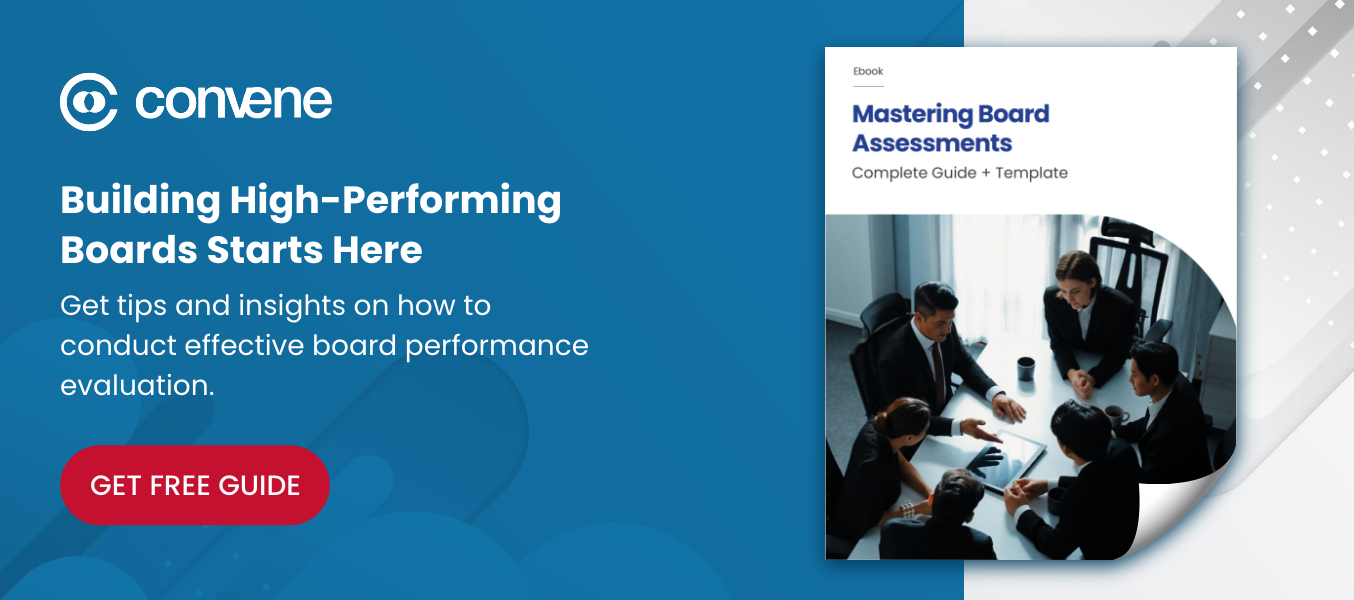When it comes to effective corporate governance, having the right composition of a board of directors is critical. Members are usually elected and appointed to bring in a diversity of expertise and perspectives. However, in some cases, ex officio members are employed to serve on the board or its committees.
Learn below what is an ex officio member, what are their responsibilities and voting rights, and the best practices to take into account.
What is an ex officio member?
According to Robert’s Rules of Order, ex officio is a Latin phrase that means “by virtue of office or position”. An ex officio member is a person who holds another office or position of relevance. While not necessarily appointed or elected, they have the same rights, duties, and privileges as the other board members — including the right to vote. They are employed for their expertise and influence in certain areas the organization or its board needs help with.
Ex officio members can be internal employees or external professionals who hold positions of relevance to the board. In essence, understanding the ex officio definition is crucial in comprehending their role within an organization or board they serve.
What is an ex officio on a board or commission?
As mentioned, ex officio members gain their seats automatically due to the current office they hold within the organization. One example is when an executive director of a parent organization automatically holds a seat on the board of a subsidiary company, as an ex officio member. This grants them a direct line of oversight without the need for a formal election or appointment process.
Automatic ex officio membership is often granted to individuals with existing positions in the organization, or who hold a specific office of relevance.
Ex officio members generally have the right to make motions, speak in debate, and vote. In some cases, they hold full voting rights, while in others, ex officio members might function in a more advisory role without voting privileges. Nonetheless, the granted ex officio voting rights may differ based on the bylaws governing the board or commission.
What do ex officio board members look like in nonprofits?
A nonprofit organization can employ ex officio members as long as their bylaws include the relevant role and privileges. Some nonprofits can include such members without allowing them to vote, and recognize them as Directors Emeritus (advisor to the board). These non-voting positions can share experience and knowledge, and attend meetings without being considered members of the board.
Here’s an overview of what ex officio members in nonprofits can look like (in terms of their roles):
- Founders or major donors: They can be ex officio board members who offer historical insights into the nonprofit’s mission and strategic guidance. They may not always have voting rights, but their perspective holds significant weight.
- Government representatives: In some cases, a representative from a government agency that funds the nonprofit might be an ex officio member. They can give guidance on regulations and funding priorities relevant to the nonprofit’s work. Voting rights may be limited depending on the bylaws to avoid conflicts of interest.
- Community leaders: These respected figures may include business owners, educators, or religious leaders. As ex officio members, they can help boost the board’s connection to the community the nonprofit serves. They may also raise awareness about the nonprofit’s mission or programs, but may not have ex officio voting rights.
Key Responsibilities of Ex Officio Members
The responsibilities of ex officio members should be clearly stated in the organization’s bylaws. While these duties may vary per organization type, here are some of their common responsibilities:
Core Responsibilities
- Participating in board meetings — They can attend board meetings regularly and actively participate in discussions. This also includes asking questions, expressing viewpoints, and contributing expertise to decision-making.
- Providing valuable sources of information — They are often responsible for providing updates on matters related to their areas of expertise, such as financial reports (CFO) operational updates (COO), or program progress reports (Director of Programs). They may also serve as an advisor on governance matters (e.g. risk management, compensation policies).
- Offering strategic insight — With their experience, they can help the organization identify risks and opportunities. Hence, contributing to the board’s long-term vision.
Additional Duties (May Vary by Organization)
Committee Membership — Ex officio members may be appointed to serve on certain board committees that align with their expertise.
- Liaison Role — They can act as a bridge between the board and the department or organization they represent. They can facilitate community, ensuring smooth information flow and decision-making.
- Ambassadorial Position (Nonprofits) — For ex officio members in nonprofits, they may play an ambassadorial role leveraging influence and connections within the community. Hence, raising awareness about the nonprofit’s mission and potentially attracting volunteers and donors.
- Ex Officio Voting Rights — This may vary significantly depending on the board or organization’s bylaws. Some may hold full voting rights, while others may serve in a more advisory capacity without voting privileges. It’s important to also note that ex officio members must not be counted towards a quorum.
One final consideration is the potential conflicts of interest that may arise. To avoid such situations, ex officio members must recuse themselves from discussions or votes where a conflict might arise. The bylaws should also outline procedures for addressing conflicts of interest.
Best Practices for Engaging Ex Officio Board Members

In most cases, ex officio members may serve on the board for the duration of their role within the company. But their unique role can sometimes create engagement challenges. Below are a few practices to maintain engagement with ex officio members:
1. Provide targeted onboarding
Regardless if the ex officio member holds a position within the organization, it’s best to tailor their onboarding to their current experience and focus on board-specific details. For instance, you can provide a condensed overview of the board’s history, governance structure, and strategic priorities.
2. Clearly define ex officio roles
At the outset, ex officio members must have a clear understanding of their specific roles and responsibilities within the board. This may include outlining their expected level of participation, ex officio voting rights (if any), and any committee memberships they may hold. Doing so gives them a better sense of purpose and contribute more effectively.
3. Conduct “Bridge the Gap” briefings
It is also ideal to consider having tailored briefings with ex officio members before meetings. You can highlight key concerns or questions that elected board members have regarding their areas of expertise. This can help ex officio members prime themselves to anticipate discussions and effectively bridge the information gap.
4. Consider bite-sized information sharing
Respect the busy schedules of ex officio members, and everyone in the meeting by providing bite-sized information updates. Leverage board technology to share curated summaries of key discussions, data visualizations, and documents between or after meetings. Opt for a board software that facilitates secure document storage and access control to ensure confidentiality for sensitive materials (e.g. voting results, committee activities).
5. Make time for impact recognition
Don’t forget to acknowledge the impact ex officio members have on the board. You can publicly recognize their contributions beyond simply thanking them for their participation. This can involve highlighting their insights in board meeting minutes, featuring accomplishments in annual reports, or nominating them for relevant awards within the organization.
Frequently Asked Questions About Ex Officio Members
Is an ex officio member required to attend board meetings?
The requirement for ex officio members’ meeting attendance can vary. Some boards may mandate attendance for all meetings, while others might allow excused absences. Ideally, this should be outlined in the organization’s bylaws. Consider factors such as the nature of the ex officio role and their voting rights.
Can ex officio members be removed from their positions?
Yes, ex officio members can be removed from their positions. However, the removal process depends on why they are being removed, which can be due to:
- Loss of qualifying position: If they lose the position within the organization that grants them automatic membership (e.g. stepping down as CEO).
- Bylaw-defined removal: Some bylaws may outline certain circumstances like misconduct, which could lead to removal from the board.
Are ex officio members subject to the same rules and regulations as regular members?
Generally, yes. Ex officio members should still adhere to the organization’s bylaws, code of conduct, and any relevant confidentiality agreement. However, there might be some exceptions:
- Voting rights: Bylaws may limit or eliminate voting rights for ex officio members.
- Committee participation: Ex officio membership does not guarantee automatic placement on specific committees.
When is an ex officio board member a conflict of interest?
This may occur when ex officio members’ interests or interests of another organization they’re affiliated with potentially clash with the best interests of the board they serve. For instance, an ex officio member stands to gain personal financial benefit from a board decision. Conflicting loyalties may also exist when an ex officio member has loyalties to another organization that could influence their decisions on the board.
Drive Better Ex Officio Engagement with Convene

Keeping ex officio board members engaged and updated can be a challenge. Their busy schedules and existing roles can make it more daunting to ensure they’re fully informed or understand their specific board role. At Convene, we aim to make this task easier for both the board and its ex officio members.
Leading board portal Convene is a perfect tool to streamline board collaboration and management. And yes, that includes engagement with ex-officio members! With Convene’s Document Library, easily create and share board materials relevant to their role. Also, take advantage of Convene’s Secure Document Sharing and give authorized access to key resources such as the board’s strategic plan and meeting minutes. Convene also offers real-time voting capabilities, ideal for ex officio members with voting rights.
Learn more about Convene’s other features to empower both your board of directors and ex offico members. Request a demo now!
Jielynne is a Content Marketing Writer at Convene. With over six years of professional writing experience, she has worked with several SEO and digital marketing agencies, both local and international. She strives in crafting clear marketing copies and creative content for various platforms of Convene, such as the website and social media. Jielynne displays a decided lack of knowledge about football and calculus, but proudly aces in literary arts and corporate governance.











